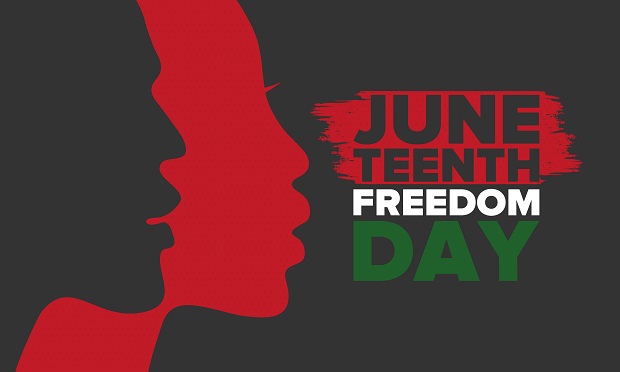 The protests have put a spotlight not only on embedded racism in every part of society, including in the workplace, but also on the public's insufficient education on U.S. history when it relates to African Americans. (Image: Shutterstock)
The protests have put a spotlight not only on embedded racism in every part of society, including in the workplace, but also on the public's insufficient education on U.S. history when it relates to African Americans. (Image: Shutterstock)
Due to recent events that have sparked a conversation on racial injustice, Juneteenth, a holiday mostly celebrated by the African American community, has exploded into popularity to the point where several major companies have declared June 19 a paid holiday.
But general counsel from Eventbrite Inc., Mastercard International Inc. and Adobe Inc. say credit is due to their culture-based employee resource groups and diversity and inclusion groups who proposed Juneteenth to be an official holiday and asked employees to educate themselves with resources from books to music as work-from-home policies are still intact.
Related: These companies lead the pack in diversity & inclusion for 2020
The May 25 police killing of George Floyd, an unarmed black man in Minneapolis, set off a chain reaction of protests across the U.S. and around the globe that have remained active for three weeks now. The protests have put a spotlight not only on embedded racism in every part of society, including in the workplace, but also on the public's insufficient education on U.S. history when it relates to African Americans.
Juneteenth is the oldest holiday to mark the end of slavery in the U.S. On June 19, 1865, the Union soldiers, led by Major General Gordon Granger, arrived in Galveston, Texas, delivering the news that the Civil War had ended and the enslaved had been granted freedom. The Emancipation Proclamation, signed by President Abraham Lincoln to end slavery, became official on Jan. 1, 1863, but news to the Confederate states had been purposely delayed.
Hella Creative, a collective of San Francisco Bay Area friends and family that united at the height of the COVID-19 pandemic, started the Hella Juneteenth project to inspire corporate America to make Juneteenth a paid observance for employees.
"Part of what we're doing all of this for is reclaiming black joy and how that looks to us and understanding our history, being respected and having our freedoms granted to us fully extended, then also just representing that it's more than taking the day off," said June Johnson, a Hella Creative member. "Companies have to drastically change their diversity and not just having black and brown people on for diversity hires, but really changing the landscape of their companies by hiring more diverse, black leadership."
As of Wednesday morning, Hella Creative had 200 companies publicly express their commitment to observing Juneteenth. Most companies, Johnson said, are committed to making Juneteenth a permanent paid holiday. The group originally reached out to companies where they had connections, and with press interviews attracting more companies, Johnson said, it "spread like wildfire in a really organic way."
Twitter Inc. and Square Inc. CEO Jack Dorsey made a splash on June 9 when he announced that both his companies will observe Juneteenth as a paid holiday. Nike Inc., the National Football League, and Target Corp., which is based in Minneapolis where Floyd's killing sparked the first protests, followed suit. Target has given store employees the option to take the paid time off or work with additional holiday pay. U.S. Bank, also based in Minneapolis, and JPMorgan Chase & Co. said they will close their branches early at 1 p.m. local time on Friday for Juneteenth. Facebook Inc., Google LLC and Amazon.com Inc. have instructed employees to cancel meetings and make June 19 a day of learning.
Julia Taylor, vice president and general counsel at Eventbrite, said the self-service ticketing platform's black employee resource group was instrumental to the company's decision to make Juneteenth an official company holiday "this year and forevermore—as a way to further express our commitment to racial justice, support the global Black Lives Matter movement, and stand in solidarity with our Black employees and creators everywhere," she wrote in a statement.
"The decision to make Juneteenth a company holiday was the result of important ongoing dialogue with our Black + Brite employee group and is just one step we are taking in order to make meaningful progress towards a globally diverse and inclusive company," she continued.
Mastercard general counsel Tim Murphy said he plays a central role in the discussions around diversity, inclusion and racial equality inside and outside the company.
"The decision to make Juneteenth a Mastercard Day of Solidarity was born out of feedback from our Black leaders and recent company-wide forums," he wrote in a statement. "It's very clear that people are willing to learn and change and have a strong desire to support their colleagues and communities, but there's not always a knowledge of how to do that. By giving our colleagues that time to learn, act and reflect—and signaling Mastercard's commitment to do so—we hope to help drive meaningful change."
As a general counsel, Murphy added that this is an opportunity to promote diversity and inclusion internally and externally through the partnerships the legal department makes with outside law firms.
"In addition, ensuring that we're inclusive within our own organization—including our legal team—as well as through our outside counsel firms, has been a longstanding practice at Mastercard," he said. "I'm pleased to share that minority-owned firms received a larger share of our spending last year than ever before, and we'll continue to advocate to have diverse voices at the table."
Dana Rao, executive vice president, general counsel and corporate secretary at Adobe, echoed the same sentiments of his company giving employees the day off to "focus on reflection and advocacy."
"As General Counsel, I believe we have a responsibility to address structural inequality in our communities and in society," Rao wrote in a statement. "The best way to begin driving change is to start within our own organization, making sure that all of our employees are empowered and included. We are committed to working closely with the Adobe Black Employee Network to continue creating lasting change both inside and outside of our company."
Spotify AB announced its flexible public holiday arrangement for employees in late 2017. Employees at the music streaming company have the choice to work on Christmas, for example, and can exchange the day for a holiday they actually celebrate as a part of their culture or religion.
As for Juneteenth, a Spotify representative said June 19 is a paid company holiday for all U.S. employees "to support the Black community and give this day the recognition it deserves." Spotify's "New Music Friday" will exclusively feature black artists on June 19 to celebrate Juneteenth along with its flagship playlist called Black Music Month, named after June being designated African American Music Appreciation Month by President Jimmy Carter in 1979.
The average U.S. holiday work calendar includes: New Year's Day, Martin Luther King Jr.'s birthday, Presidents' Day, Memorial Day, Independence Day, Labor Day, Columbus Day, Veterans Day, Thanksgiving and Christmas. That excludes many holidays aligned in other cultures and religions that have festivities in communities, including Diwali, Eid at the end of Ramadan, Chinese New Year, and National Coming Out Day, for example, which may not happen in the workplace. The push for Juneteenth could mean a push toward flexible holidays as a diversity and inclusion initiative.
Participating companies expressed in their messages that they hope employees enjoy the day to participate in civic engagement, read anti-racism and black culture books and essays, listen to music by black artists, and overall learn how to be allies for racial equality for everyone.
Juneteenth is recognized as a holiday in 46 states and the District of Columbia though this is the first year a number of companies on a large scale are giving employees the day off. It is not a federal holiday.
Read more:
© Touchpoint Markets, All Rights Reserved. Request academic re-use from www.copyright.com. All other uses, submit a request to [email protected]. For more inforrmation visit Asset & Logo Licensing.







